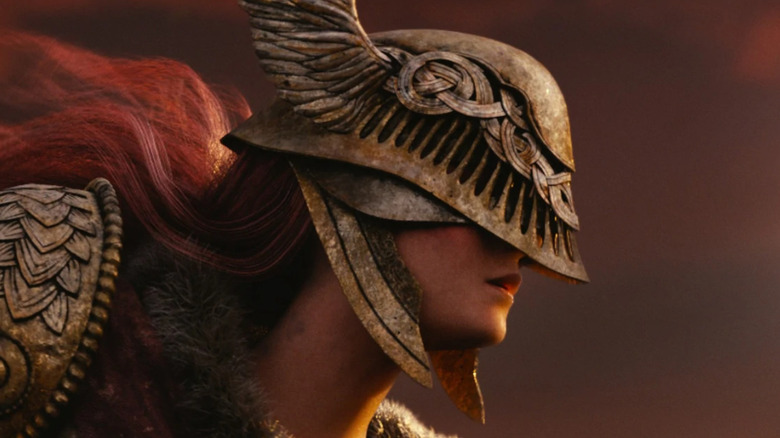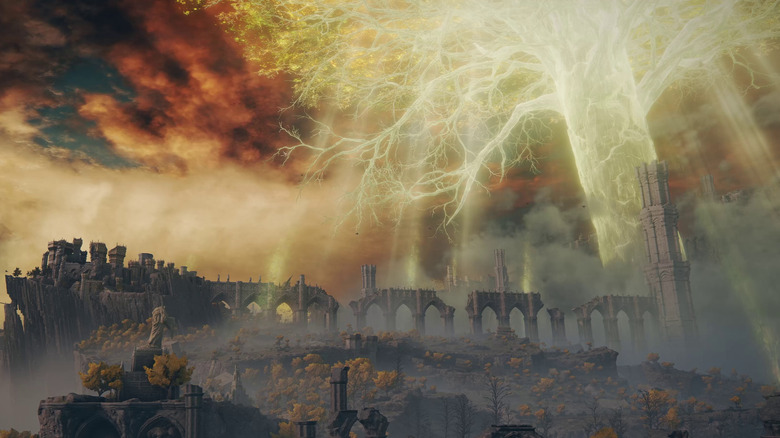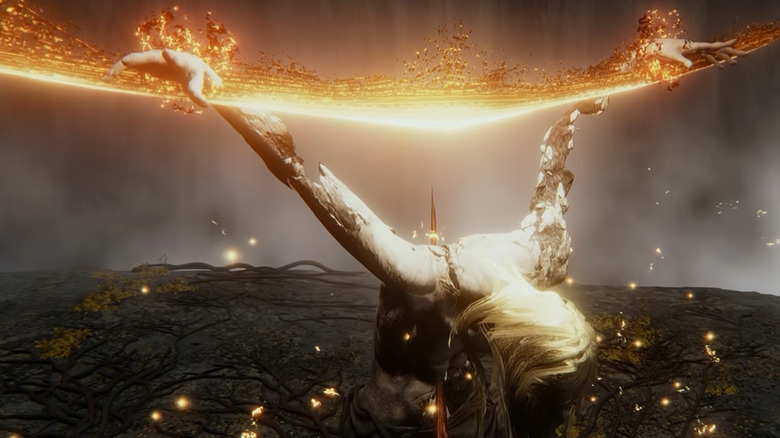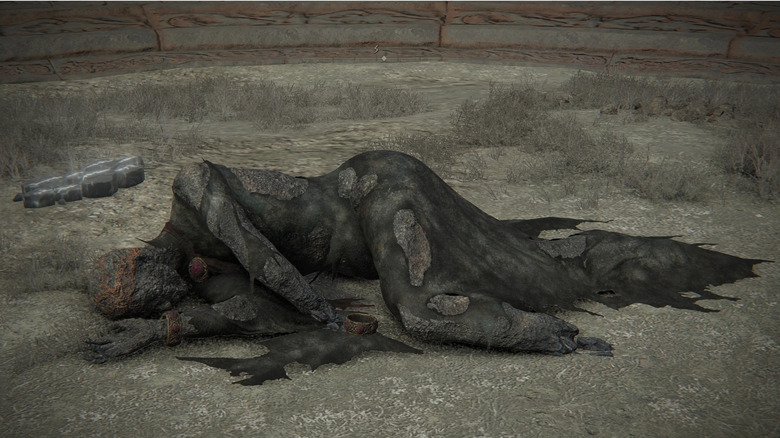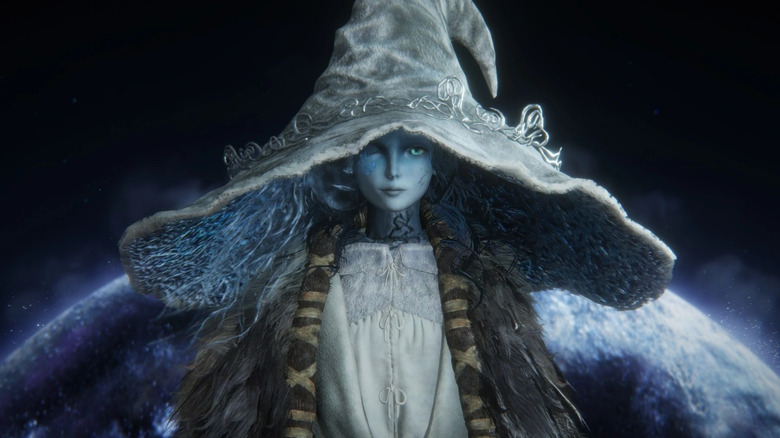The Mythology In Elden Ring Explained
First, a disclaimer: there will likely never be a full, comprehensive explanation of every bit of lore hidden in "Elden Ring"'s massive, painstakingly designed setting. Not one that's able to account for every little detail, anyhow. The game inherits and builds upon the unusual method of storytelling as engineered by Hidetaka Miyazaki, director of "Dark Souls" and every FromSoftware Soulsborne game to date. Bolstered and enriched by the involvement of George R. R. Martin — a creative renowned for his own sprawling and intricate worldbuilding — the story of "Elden Ring" is as enigmatic as it is compelling.
The names and events invoked in the main narrative beats resonate with ancient significance, yet the keys to the "why" or "how" are often hidden in the descriptions for optional items, or dialogue from characters in far-flung places. Piecing together the full picture of the game's hidden stories is a full-on scavenger hunt that spans the entirety of the game. Even with every bit of in-game content scoured by avid fans (and neatly compiled into informative videos, such as the one by VaatiVidya), many mysteries remain unsolved.
So it's perhaps best to break down the very basic components of the mythology, as it were, that serves as the foundation for the game's story: the gods and demi-gods, who they are and how they came to be.
Beware of spoilers ahead for "Elden Ring."
It all starts in the cosmos
Intriguingly, every main force that sets the events of "Elden Ring" in motion comes from outer space. Taking the somewhat popular approach of incorporating basic astronomy and cosmology through the language of Lovecraftian 'eldritch-ness,' the game presents what they call the "Outer Gods" as faraway, unknowable entities of unimaginable power. There are at least four confirmed Outer Gods, each with their own influence on the Lands Between — of them, the being known as the 'Greater Will' plays the principal role in the story.
The incantation for Elden Stars — one of the most powerful spells in the game — reveals that "long ago, the Greater Will sent a golden star bearing a beast into the Lands Between, which would later become the Elden Ring." This aforementioned 'beast' is very likely the final boss of the game, aptly titled the 'Elden Beast'; upon defeat, it drops an item that claims "it was the vassal beast of the Greater Will and living incarnation of the concept of Order."
While the text remains unhelpfully vague on when or how the beast became the Elden Ring, it's clear that the Greater Will is the creator and source of the ring's power, and that it has a vested interest in the Lands Between.
Divinity in the Lands Between
So, this Greater Will sent a shooting star with a beast-ring that wasn't a physical accessory so much as a collection of runes that could dictate the laws of reality. At some point, this beast created and occupied the Erdtree, then— at yet another unidentified point in time— it chose Marika to serve as its champion and raised her to godhood.
Once again, the details are vague; and the criteria for 'godhood' as described in the Lands Between actually seem quite nebulous. Over the course of the game, the player learns of (and sometimes even fights) gods that exist independently of the Elden Ring and its Golden Order, that may or may not have existed before its arrival from space. A possible theory is that all divinity on the planet stems from one Outer God or another sending their own envoys and artifacts to empower select inhabitants — but that is, inevitably, pure speculation.
What is known is that Marika's godhood was given to her by the Greater Will, strongly implying that she was a regular mortal beforehand. She proceeded to pluck the rune of "Destined Death" — i.e. mortality as an inevitable eventuality— from the Elden Ring, effectively rendering herself and her subjects immortal (though it seems she alone could sentence people to death). With this, she began her campaign to conquer the realms around her, eventually forming her kingdom in the Lands Between.
Demi-gods, eight in total
It's worth noting that becoming Elden Lord — which is the ultimate goal of the player character — does not entail becoming a god yourself, but rather a consort to a god. Godfrey, the first Elden Lord, was imbued with the powers of the Elden Ring by his marriage to Marika, serving as her protector and champion both. Together, they had children who were all born as demi-gods, presumably due to Marika's godhood (in the fashion of Heracles or Perseus from Greek myth).
Unlike the nebulous and vaguely classified gods of the Lands Between, the roster of demi-gods is a rather unambiguous and very quantifiable list of individuals: Godwyn, Morgott, and Mohg from her first marriage, then Malenia and Miquella from her second.
Strangely, fans seem to agree that the list of demi-gods includes Ranni, Radahn, and Rykard, Marika's three step-children from her second husband, Radagan. Logically, they wouldn't hold any divinity due to the fact that they aren't Marika's biological children. The answer to this question lies in the massive twist revealed through a hidden statue puzzle: Radagan is Marika. The details of how this dual identity actually works are entirely obscured, but at the very least it explains the demi-godhood of offspring seemingly unrelated to the Elden Ring's power.
(And no, we don't really understand what's up with Malenia and Miquella being born from two incarnations of the same person, either.)
The Greater Will's system of Empyreans
Empyreans are the final piece in the "Elden Ring" mythology, being yet another enigma themselves. There are many theories as to what an Empyrean is or how they're made. One in-game incantation states that being born of a singular god means that the children are, in fact, Empyreans. As noted by Game Rant, the only concrete commonality so far is that they are candidates chosen by the Greater Will to serve as the next vessel for the Elden Ring. Once chosen, an Empyrean is given a wolf that serves with absolute loyalty as their "shadow" — Maliketh being Marika's shadow seemingly implies that she was once an Empyrean herself before ascension.
The current Empyreans are Malenia, Miquella, and Ranni, though Ranni possibly no longer qualifies due to inhabiting a marionette doll in lieu of her original body. However, Ranni is the only Empyrean who offers an alternate ending: instead of becoming the third Elden Lord and reigning over the Lands Between, the player can opt to marry Ranni instead and help her supplant her father/stepmother as the god of the Golden Order.
At first glance, having Ranni depart the planet to release it from the Greater Will's power seems a much better outcome than marrying Marika's shattered body. However, with the possible influence of other Outer Gods lurking at the edges of the lore, who can really say? For now, all fans can do is wait and hope that there will be DLC to pick apart for further clues.

